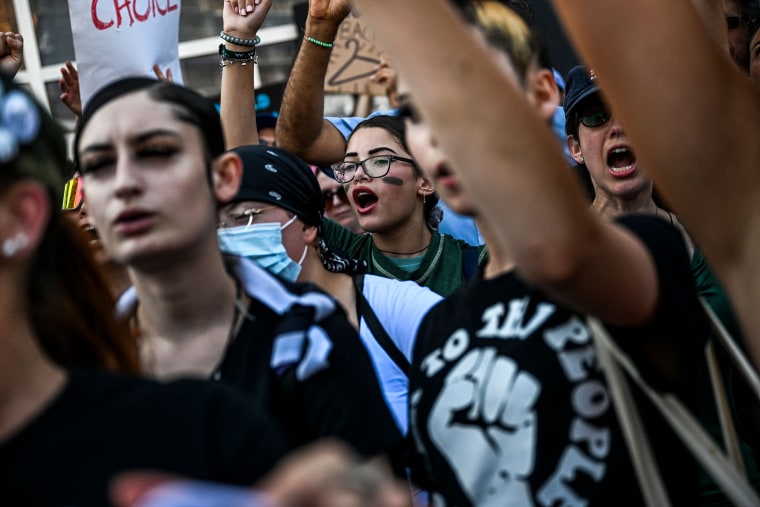Opening arguments kicked off Wednesday at the Florida Supreme Court in a case over whether a proposed amendment that would enshrine abortion rights in the state constitution can appear on the November ballot.
The case stemmed from a challenge from conservatives, including state Attorney General Ashley Moody, a Republican, who contended that the ballot language was designed to mislead voters.
The abortion rights group that led the effort to place the measure on the ballot, Floridians Protecting Freedom, had already collected the necessary number of validated signatures of registered voters in the state. And state officials quickly announced it would appear as “Amendment 4” in November.

But under Florida law, the state Supreme Court gets to review the proposed language by any citizen-initiated constitutional amendment proposal before it can formally advance to the ballot.
In this case, Moody filed a challenge urging the conservative court to keep the question from appearing on the ballot altogether and slamming the measure as an effort designed to “hoodwink” voters, because, among other reasons, abortion-rights supporters and opponents have different opinions on the definition of fetal viability.
Advocates on both sides of the issue have long viewed the challenge as conservatives’ best chance to stop the measure from appearing because of the court’s makeup. Five of its seven justices have been appointed by Republican Gov. Ron DeSantis, a fierce opponent of abortion.
Throughout the nearly one-hour hearing Wednesday, those justices threw tough questions at the attorneys representing Floridians Protecting Freedom and frequently suggested they felt the proposed ballot summary language could be too far-reaching.
“This is a wolf that comes as a wolf,” said Chief Justice Carlos Muñiz, a DeSantis appointee. “The summary makes it pretty obvious that it’s sweeping.”
At another moment, Muñiz also indicated he felt the measure's language wasn't misleading.
"It’s pretty obvious that this is a pretty aggressive, comprehensive approach to dealing with this issue,” he said.
At other points, several justices seemed to suggest to attorneys advocating for the amendment that the proposal didn't make it clear that it was explicitly designed to protect abortion rights.
“That is not being communicated to the voters in the way that the language of the ballot summary and the amendment is drafted now,” said Justice Renatha Francis, a DeSantis appointee. “And that is important.”
“Isn’t that part of the job of the proposed amendment to make sure that they are communicating the chief purpose and the effect of what it is that this proposed amendment would actually do?” Francis added.
Justices also raised questions about whether the proposed language adequately described “viability” or whether it detailed broader issues, such as whether it made the legal ramifications of passing the measure clear to voters.
“How do we expect the voters to understand the legal effect when there’s no explanation at all given as to a legal effect?” asked Justice Meredith Sasso, another DeSantis appointee. “Every law that’s been passed in Florida has been a categorical ban at a certain week.”
The court has until April 1 to approve or reject the proposed language.
The proposed amendment would bar restrictions on abortion before fetal viability, considered to be at about the 24th week of pregnancy. It would include exceptions past that point for “the patient’s health, as determined by the patient’s healthcare provider.”
Abortion is legal in Florida up to 15 weeks, though the state Supreme Court will also determine that law’s future.
If the court upholds the law, a six-week abortion ban, with exceptions for rape, incest and the woman’s life — which was enacted last year but remains blocked — would be allowed to stand.
If the abortion-rights amendment appears on the ballot and is ultimately passed, it would effectively undo both.
The effort by pro-abortion-rights groups in Florida to place the ballot measure is one of at least 10 across the U.S. seeking to put abortion rights directly in the hands of voters in 2024. Having abortion questions on ballots could help boost Democratic turnout in the 2024 presidential election.
